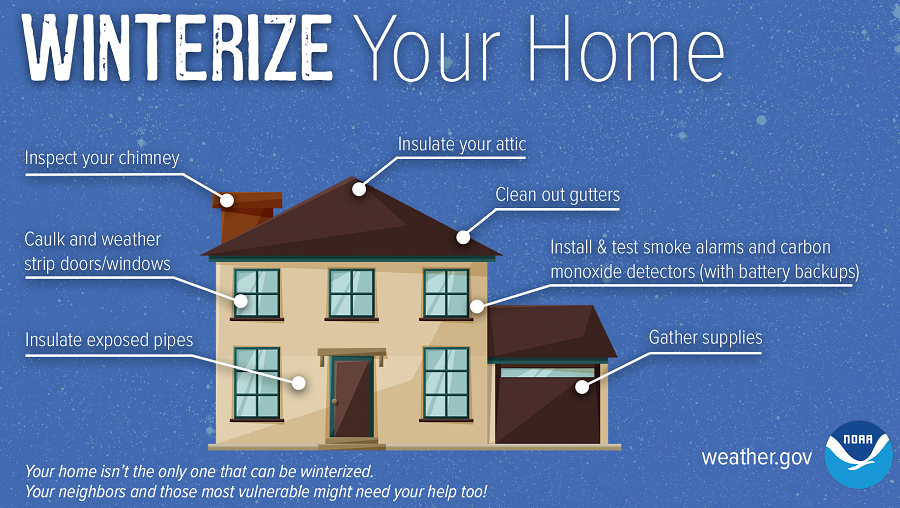Rutherford County, TN— With Sunday night’s snowfall amounts and more expected on Thursday, Rutherford County Emergency Management Agency is teaming up with the Tennessee Emergency Management Agency (TEMA) to offer winter weather preparedness tips.
“Sunday night’s weather caused a lot of incidents for our public safety agencies,” shared Chris Clark, Public Safety Director. “We responded to 69 calls for response including power outages and downed lines, fallen trees, car accidents, and more.” Clark noted that dispatch reported around 123 incoming and outgoing calls from 10 p.m. on January 2 until 7 a.m. on Jan. 3.
Emergency Kits and Family Communications Plans
TEMA and RCEMA both recommend that residents look through their current emergency kits and add supplies specific to winter. “If you do not have an emergency kit for your home,” said Clark, “it’s time to put one together.”
Typical emergency kit items can be found at ready.gov, but winter additions should include:
- Rock salt or more environmentally safe products to melt ice on walkways. (Remember that these products can be harmful to dogs, so be sure to choose a non-toxic brand if you or your neighbors have pets.)
- Sand/gravel to improve traction.
- Snow shovels or other snow removal equipment.
- Heating fuel. If you have a fireplace or wood-burning stove, keep a supply of good, dry wood for heating in case you lose power.
- Adequate clothing and blankets to keep warm, including coats, sweaters, hats, gloves, mittens, scarves, etc.
Keep your radio on WGNS (AM 1450, FM 101.9 and FM 100.5) and keep a NOAA Weather Radio in your kit to receive broadcast alerts and warnings directly from the NWS for all hazards. You may also sign up in advance to receive notifications from your local emergency services.
Scroll down for more...
Continued...
The agencies also recommend creating a Family Communications Plan. Because your family may not be together when the weather disaster strikes, it is important to know how you will contact one another, how you will get back together, and what you will do in case of an emergency.
Prior to the bad weather hitting, residents should download helpful, free smartphone apps such as ReadyTN and those available from FEMA, the American Red Cross, and NOAA National Weather Service. In addition to providing you with important weather information, some of these apps also have information about shelters, first aid, and seeking assistance for recovery.
Be Informed
Know the following terms and what actions to take. Be alert to weather reports and tune in for specific guidance when these conditions develop:
- Freezing Rain: Rain that freezes when it hits the ground, creating a coating of ice on roads, walkways, trees and power lines.
- Sleet: Rain that turns to ice pellets before reaching the ground. Sleet also causes moisture on roads to freeze and become slippery.
- Wind Chill: Wind chill is the temperature it “feels like” when you are outside. The NWS provides a wind chill calculator to show the difference between air temperature and the perceived temperature and the amount of time until frostbite occurs.
- Winter Weather Advisory: The NWS issues a winter weather advisory when conditions are expected to cause significant inconveniences that may be hazardous. If caution is used, these situations should not be life-threatening.
- Winter Storm Watch: A winter storm is possible in your area. The NWS issues a winter storm watch when severe winter conditions, such as heavy snow and/or ice, may affect your area but the location and timing are still uncertain.
- A winter storm watch is issued 12 to 36 hours in advance of a potential severe storm. Tune in to NOAA Weather Radio, local radio, TV, or other news sources for more information.
- Monitor alerts, check your emergency supplies, and gather any items you may need if you lose power.
- Winter Storm Warning: A winter storm is occurring or will soon occur in your area.
- Blizzard Warning: Sustained winds or frequent gusts to 35 miles per hour or greater and considerable amounts of falling or blowing snow (reducing visibility to less than a quarter mile) are expected to prevail for a period of three hours or longer.
- Frost/Freeze Warning: Below freezing temperatures are expected.
The County has a free alerting service, but residents must sign up for it. It is called Alert Rutherford and the registration is available at http://www.rcecd911.org/alertrutherford/.
Other things that you can do to prepare for winter weather conditions in your home and during your travels—
Winterizing Your Home
- Winterize your home to extend the life of your fuel supply by insulating walls and attics, caulking and weather-stripping doors and windows, and installing storm windows or covering windows with plastic.
- Winterize your house, barn, shed or any other structure that may provide shelter for your family, neighbors, livestock or equipment. Clear rain gutters, repair roof leaks and cut away tree branches that could fall on a house or other structure during a storm.
- Maintain heating equipment and chimneys by having them cleaned and inspected every year.
- Insulate pipes with insulation or newspapers and plastic and allow faucets to drip a little during cold weather to avoid freezing. Running water, even at a trickle, helps prevent pipes from freezing.
- All fuel-burning equipment should be vented to the outside and kept clear.
- Keep fire extinguishers on hand, and make sure everyone in your house knows how to use them. House fires pose an additional risk during the winter, as more people turn to alternate heating sources without taking the necessary safety precautions.
- Learn how to shut off water valves in case a pipe bursts.
- Hire a contractor to check the structural ability of the roof to sustain unusually heavy weight from the accumulation of snow or water.
Travel During Winter Weather
Both agencies say travel by car should be limited during a winter storm. “Even if winter weather conditions aren’t obviously present, conditions like black ice can cause vehicles to lose control,” warns Clark.
Weatherizing your vehicle for the winter is also recommended. This includes:
- Ensuring that antifreeze levels are sufficient to avoid freezing
- Ensuring your battery and ignition are in top condition and battery terminals are clean
- Checking for wear and fluid levels of brakes
- Checking for leaks and crimped pipes in the exhaust system and repairing/replacing as necessary
- Maintaining a full tank of gas, replacing air filters, and keeping water out of the system by using additives
- Ensuring the heater and defroster are working properly
- Checking lights and hazard lights to make sure they’re working properly
- Checking oil level and weight
- Repairing any issues with windshield wipers and maintaining proper wiper fluid levels
Drivers should also add the following items to their winter weather supply kits in their vehicles:
- Shovel
- Windshield scraper and small broom
- Flashlight
- Battery powered radio
- Extra batteries
- Water
- Food
- Matches
- Extra clothing and blankets to keep warm
- First aid kit
- Medications
- Tow chain or rope
- Jumper cables
- Road salt and sand
- Emergency flares
- Florescent distress flag
Smoke and Carbon Monoxide Alarms
Lastly, the agencies discuss having the proper amount of working smoke alarms in the home, as well as carbon monoxide alarms in central locations on every level of the home and outside sleeping areas to provide early warning.
“Carbon monoxide-related deaths are highest during colder months and are likely due to increased use of gas-powered furnaces and alternative heating, cooking, and power sources used inappropriately indoors during power outages,” reports TEMA.
Tips to avoid carbon monoxide poisoning, shock, or fire:
- Never use a generator, grill, camp stove, or other gasoline, propane, natural gas or charcoal-burning devices inside a home, garage, basement, crawlspace, or any partially enclosed area. Locate the unit away from doors, windows, and vents (at least 20 feet away) that could allow carbon monoxide to come indoors.
- If the alarm sounds, move quickly to a fresh air location outdoors or an open window or door.
- Call for help from the fresh air location and remain there until emergency personnel arrive to assist.
Like the carbon monoxide alarms, having the right amount of working smoke alarms in your home is extremely important. Rutherford County Fire Rescue (RCFR) Fire Marshal Joshua Sanders states, “Having the proper amount of working smoke alarms in your home can cut your risk of home fire death in half.”
RCFR has a free smoke alarm installation program. For more information or to schedule an installation, call the administration office at 615-867-4626 Mon.-Fri. 8 a.m.-4:30 p.m
“The goal of TEMA and RCEMA is the same,” said Clark. “We simply want our citizens to have the best emergency preparedness information so they can put plans into place to protect the ones they love the most.”
For more emergency preparedness tips, visit ready.gov.


